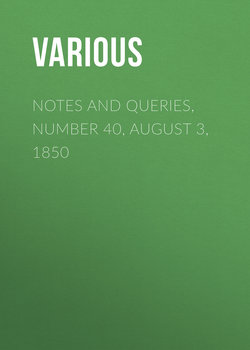Читать книгу Notes and Queries, Number 40, August 3, 1850 - Various - Страница 3
NOTES
PULTENEY'S BALLAD OF "THE HONEST JURY."
ОглавлениеOn the application for a new trial, in the case of The King against William Davies Shipley, Dean of St. Asaph (1784), wherein was raised the important and interesting question, whether in libel cases the jury were judges of the law as well as the fact, Lord Mansfield, in giving judgment, remarked in reference to trials for libel, before Lord Raymond:
"I by accident (from memory only I speak now) recollect one where the Craftsman was acquitted; and I recollect it from a famous, witty, and ingenious ballad that was made at the time by Mr. Pulteney; and though it is a ballad, I will cite the stanza I remember from it, because it will show you the idea of the able men in opposition, and the leaders of the popular party in those days. They had not an idea of assuming that the jury put it upon another and much better ground. The stanza I allude to is this:—
"'For Sir Philip well knows,
That his innuendos
Will serve him no longer,
In verse or in prose;
For twelve honest men have decided the cause,
Who are judges of fact, though not judges of laws.'
"It was the admission of the whole of that party; they put it right; they put it upon the meaning of the innuendos; upon that the jury acquitted the defendant; and they never put up a pretence of any other power, except when talking to the jury themselves."
In Howell's State Trials (xxi. 1038.) is a note on this passage. This note (stated to be from the Speeches of Hon. Thomas Erskine) is as follows:—
"It appears by a pamphlet printed in 1754, that Lord Mansfield is mistaken. The verse runs thus:—
"'Sir Philip well knows,
That his innuendos
Will serve him no longer in verse or in prose:
For twelve honest men have determined the cause,
Who are judges alike of the facts and the laws.'"
Lord Campbell, in his Lives of the Chancellors (v. 25.) and Lives of the Lord Chief Justices (ii. 543.), and Mr. Harris, in his Life of Lord Chancellor Hardwicke (i. 221.), give the lines as quoted by Lord Mansfield, with the exception of the last and only important line, which they give, after the note to Erskine's speeches, as
"Who are judges alike of the facts and the laws."
And Lord Campbell (who refers to State Trials, xxi.) says that Lord Mansfield, in the Dean of St. Asaph's Case, misquoted the lines "to suit his purpose, or from lapse of memory."
I know not what is the pamphlet referred to as printed in 1754; but on consulting the song itself, as given in the 5th volume of the Craftsman, 337., and there entitled "The Honest Jury; or, Caleb Triumphant. To the tune of 'Packington's Pound,'" I find not only that Lord Mansfield's recollection of the stanza he referred to was substantially correct, but that the opinion in support of which he cited it is expressed in another stanza besides that which he quoted. The first verse of the song is as follows:
"Rejoice, ye good writers, your pens are set free;
Your thoughts and the press are at full liberty;
For your king and your country you safely may write,
You may say black is black, and prove white is white;
Let no pamphleteers
Be concerned for their ears;
For every man now shall be tried by his peers.
Twelve good honest men shall decide in each cause,
And be judges of fact, tho' not judges of laws."
In the third verse are the lines Lord Mansfield cited from memory:—
"For Sir Philip well knows
That innuen-does
Will serve him no longer in verse or in prose;
Since twelve honest men have decided the cause,
And were judges of fact, tho' not judges of laws."
Lord Campbell and Mr. Harris both make another mistake with reference to this ballad which I may perhaps be excused if I notice. They say that it was composed on an unsuccessful prosecution of the Craftsman by Sir Philip Yorke, and that this unsuccessful prosecution was subsequent to the successful prosecution of that paper on December 3rd, 1731. This was not so: Sir Philip Yorke's unsuccessful prosecution, and to which of course Pulteney's ballad refers, was in 1729, when Francklin was tried for printing "The Alcayde of Seville's Speech," and, as the song indicates, acquitted.
C.H. COOPER.
Cambridge, July 29. 1850.
